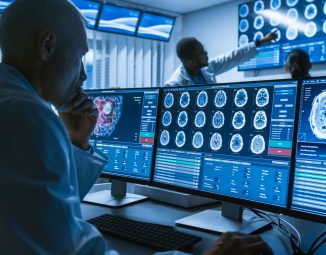The Race to Create a COVID-19 Vaccine: Acceleration and Collaboration
From the very outset of the COVID-19 pandemic the development of an effective and safe vaccine for COVID-19 became a public and private priority pursed with urgency and intensity. Towards that end, the United States government and federal agencies are collaborating with private biopharmaceutical companies to accelerate the vaccine development. This article will briefly summarize the following: (1) regulatory efforts to accelerate vaccine development, (2) the various collaborations established to develop a vaccine, and (3) the current state of the most promising—and government funded—clinical trials.
Regulatory Efforts to Accelerate Vaccine Development
Vaccine development is typically a lengthy process—with years of laboratory research, the need to obtain approval by the Food and Drug Administration (FDA), and at least three (3) phases of clinical trial testing to ensure safety, efficacy, and the appropriate dosage. However, due to the severity of the COVID-19 pandemic, there have been calls for significant modifications to the process to expedite the vaccine development for use. For example, the FDA launched the Coronavirus Treatment Acceleration Program (CTAP) in late March to streamline the process by which a COVID-19 vaccine is developed while simultaneously ensuring its safety and effectiveness for the public. Some measures implemented by CTAP include the following:
- FDA staff triages requests from developers/scientists to develop a COVID-19 drug or biologic therapy immediately upon receipt, and connects the requesting them in contact with the appropriate FDA staff within one day.
- The FDA provides rapid interactive input to developers/scientists on how best to advance their studies to clinical development (i.e., the three-phase clinical trial testing), prioritizing those plans with scientific merit.
- In some cases, the FDA provides rapid protocol review within twenty-four (24) hours of the submission of an Investigation New Drug (IND) application. An IND application must describe the vaccine, its planned method of manufacture, identification of quality control tests for release of the vaccine, and the demonstration of the vaccine’s safety and ability to elicit a protective immune response in both animal and human testing;
- The FDA works closely with developers/scientists and regulatory agencies to accelerate quality assessments for COVID-19 vaccines. For example, the FDA will use resources available from its partners in both the public and private sectors to determine whether an experimental vaccine or treatment for COVID-19 can safely and effectively benefit patients.
In addition to the accelerated timeline for the development of a COVID-19 vaccine, the FDA is also working with developers/scientists on the development of drug and biological treatments. The FDA issued non-binding guidance in May 2020 to assist developers/scientists developing COVID-19 drugs and biological treatment or prevention. It is important to note that this guidance does not apply to preventative vaccines; instead, this guidance sets forth various considerations for those developers/scientists seeking to develop drugs and biological treatments for COVID-19. Some considerations from the FDA guidance include the population to select for a drug/treatment trial, how to design the clinical trial, and how to evaluate the efficacy of the trial. The full FDA guidance is available here.
Collaborating Efforts for Vaccine Development
In addition to the FDA’s role in the development of a vaccine, on April 17, 2020, the National Institutes of Health (NIH) announced the formation of a partnership: Accelerating COVID-19 Therapeutic Interventions and Vaccines (ACTIV)—an international partnership among the European Medicines Agency, the United States Department of Health and Human Services (HHS) Office of the Assistant Secretary for Preparedness and Response, the FDA, the Centers for Disease Control and Prevention (CDC), and sixteen (16) biopharmaceutical companies. ACTIV, with infrastructure support from government agencies and subject matter expertise from its industry partners, seeks to identify, prioritize, and facilitate the most promising vaccine candidates into clinical trials. Together, the public and private counterparts of ACTIV are working to create a collaborative framework to fast-track the development of a vaccine for COVID-19. For more information related to ACTIV and its mission, visit the NIH press release available here.
Further, on May 15, 2020, the Trump Administration established “Operation Warp Speed” (OWS) to accelerate the development, manufacturing, and distribution of COVID-19 vaccines, therapeutics, and other medical countermeasures. OWS is a partnership that includes the Department of Defense and various agencies from HHS, including the CDC, the FDA, the NIH, and the Biomedical Advanced Research and Development Authority (BARDA). The primary goal of OWS is to deliver 300 million doses of an effective and safe vaccine for COVID-19 by January 2021. To help accomplish this goal, OWS will also coordinate with other established initiatives like the ACTIV partnership and NIH’s Rapid Acceleration of Diagnostics (RADx) initiative. For more information regarding the RADx initiative, please visit the NIH’s website available here.
As of June 16, 2020, OWS has selected fourteen (14) vaccine candidates—which it will ultimately narrow down to seven (7) candidates—with the most promising to provide support through the manufacture and distribution of the vaccine during their clinical trials. OWS has not yet made the names of the fourteen candidates public.
Current Vaccine Clinical Trials with Support from HHS
Clinical trials for vaccines are often conducted in three (3) phases that may take several years. CDC and the FDA generally describes the clinical trial phases as follows:
- Phase I tests the trial vaccine on a small group of individuals to evaluate safety, appropriate safety, and any side effects;
- Phase II tests the trial vaccine with a larger group of people—often comprised of those for whom the vaccine is intended, if it is intended for a particular demographic (e.g., age and physical health)—and assesses its safety and efficacy;
- Phase III tests the trial vaccine on thousands of people to confirm its effectiveness and safety, monitor its side effects, and collect information to ensure the vaccines safe use on the general public.
To support OWS in its goal to accelerate this timeline and develop a vaccine for COVID-19 sooner rather than later, the federal government has awarded financial support to four candidate vaccines at varying phases of their clinical trials.
- Novavax: On July 7, 2020, OWS announced its largest award of $1.6 billion to Novavax—a Maryland-based biotechnology company—for the development of its candidate vaccine. Novavax plans to use this federal funding to conduct Phase III of its clinical trial and shore up production of the vaccine in advance of its potential FDA approval. The company expects Phase III to begin in the fourth quarter of the fall, if not late in the third quarter—with an ultimate goal of delivering 100 million doses of its vaccine by February 2021. Notably, Novavax received $388 million in funding from the Coalition for Epidemic Preparedness Innovations (a foundation of which the U.S. government is not affiliated) for the earlier phases of the vaccine’s clinical trial and entered into a $60 million contract with the Department of Defense (DoD) in June to deliver 10 million doses of its vaccine to the DoD.
- AstraZeneca: HHS announced that it will provide up to $1.2 billion in support of AstraZeneca’s candidate vaccine, which has been developed in conjunction with University of Oxford scientists. As a result of HHS’s large endowment, AstraZeneca agreed to make available 300 million doses of its candidate vaccine to be delivered as early as October 2020.
- Moderna: HHS provided $483 million to Moderna—who is partnering with the National Institute of Allergy and Diseases—to develop a vaccine that does not require an active virus. Moderna’s candidate vaccine is currently in Phase II to evaluate safety and effectiveness on a smaller sample size (i.e., 600 people). On June 11, 2020, Moderna announced that its candidate vaccine will enter Phase III of its clinical trial in July. This Phase III, the final phase, will evaluate the effectiveness and safety of Moderna’a trial vaccine in 30,000people. The Moderna vaccine reached—and in some cases, surpassed—the level of antibodies capable of neutralizing the COVID-19 virus in all eight (8) individuals given the vaccine from Phase I.
- Johnson & Johnson: HHS announced that it will provide $456 million in funding to Johnson & Johnson for its candidate vaccine that combines genes from COVID-19 with a modified adenovirus. Johnson & Johnson is expected to begin Phase I of its clinical trial in the second half of July.
To combat the COVID-19 pandemic, this unprecedented public/private partnership, involving accelerated approval processes from the FDA and substantial financial support from federal agencies may not only be effective in the successful development of multiple effective and safe vaccines, but also serve as a road map for future responses to serious disease outbreaks throughout the world. The race for effective and safe vaccines for COVID-19 will benefit from these public and private partnerships and collaboration. There are some predictions—namely, from Dr. Anthony Fauci—that all of these efforts may result in the possibility of effective vaccines being available before the end of 2020. Hopefully, we will know more as vaccine candidates enter the later phases of their clinical trials throughout this summer.
The information contained in this publication should not be construed as legal or medical advice, is not a substitute for legal counsel or medical consultation, and should not be relied on as such.






